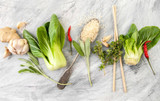What can you expect for 2019? We have created a list of our predictions for up and coming health & wholefood trends. From Fermented Foods to Native Flavours, we think the New Year is going to be exciting, fun and healthy!
NATIVE FLAVOURS
In 2019 we expect to see more Australian consumers exploring our native flavours. Finger lime, riberry, wattleseed, quandong, lemon myrtle and davidson plum are among the many species of bush tucker available. Beyond the original flavours of native foods, the health benefits are also incredibly unique with kakadu plum, for example, boasting the highest Vitamin C levels of ANY fruit in the world.

COLLAGEN
Up until now, collagen was considered purely a beauty ingredient. New studies are showing that Collagen in beneficial to joint, bone and muscle support, sports, and digestive health. While collagen was once purely available in topical creams and lotions, edible and drinkable collagen sources are now becoming more common. This has created new opportunities for beverage, food, and supplement manufacturers.
MEDITERRANEAN INGREDIENTS
The Mediterranean diet is starting to gain more traction with its combination of health benefits and delicious flavours. There is an emphasis on olive oil, fresh fruits and vegetables, protein-rich legumes, fish and whole grains as well as moderate amounts of wine and red meat. Consumers are exploring these ingredients more in an effort to manage weight, combat high blood pressure and cholesterol, and also improve heart health.
The top Mediterranean ingredients include:

LOW SUGAR/NATURAL SWEETENERS
By now, millions of people are aware of the adverse effects of sugar but are still craving a sweet fix. In 2018 we saw an increase in consumers looking for products that are either sugar-free (sweetened with xylitol or stevia) or made with natural sugar alternatives (brown rice syrup or pure maple syrup). We expect this trend to become the norm as more and more people are educated about sugar.
GUT HEALTH
Prebiotics, Probiotics & Fermented Foods
Knowledge is spreading about gut health and its importance to overall health and wellness. Digestion issues that may have been once ignored are now able to be managed with the food that we consume. Probiotics drinks such as Kombucha, Kefir and Vinegar Tonics flooded the shelves in 2018 and with the knowledge of gut health becoming more prominent, we expect to find more shelf-stable foods incorporating gut-friendly bacteria. These include granola, nut butters, bars, and soups.
Sauerkraut, kimchi, miso, apple cider vinegar, coconut vinegar, and other fermented foods are also becoming household staples due to their naturally rich probiotic content.

ZERO WASTE
Conscious consumers are opting to bring their own jars, buy in bulk, and shop products with recyclable packaging. This also includes choosing to DIY natural beauty, gifts and common packaged foods (i.e crackers, muesli bars and nut milks).
MARINE BASED FOODS
In 2019, expect to see more foods sourced from the ocean – and not just fish, but a variety of kelps and algae. Sea vegetables are a rich source of vitamins, minerals and anti-oxidants, causing more consumers to branch out from the most common Nori and explore more options.

FATS & PROTEIN
Protein has been trending for quite some time with no signs of slowing down. Protein assists with muscle recovery and growth, and helps keep people fuller for longer. Therefore, more consumers are looking to eat a serving of protein with every meal.
Lean meats are the most common source however organic legumes, nuts, oats, broccoli and plant-based protein powders are also high in protein and suitable for most diets.
Read our blog Top 10 Sources For Plant-Based Protein
Consumption of healthy fats, such as the omegas, is also rising thanks to the popularity of the Keto diet. Good fats help to regulate blood sugar levels and promote a healthy weight. Expect to see more foods and drinks made with oils, coconut butter, avocado, and ghee.
PLANT-BASED FOODS
Plant-based cooking and ingredients were a trend in 2018 and will continue into 2019. More familiarity and education surrounding the vegan diet and its benefits has led to more people willingly choosing vegan or vegetarian food alternatives. Many now understand that following a nutritious plant-based diet will make for a much healthier, more sustainable and environmentally friendly lifestyle. As a result, more and more nutritious, tasty plant-based dishes and recipes are popping up across menus, blogs, cookbooks and social media.
Some of the essential nutrient-dense plant-based ingredients include:
- Nuts and Seeds
- Pulses (beans, peas & lentils)
- Grains and Rice
- Alternative seasonings such as Nutritional Yeast, Miso Paste, Sea Vegetables

"FREE FROM"
Eggs, dairy, wheat, gluten and refined sugar are being avoided due to allergies and dietary preferences. Expect to see more “free from” goods on the shelves as more consumers adopt these preferences.
BOWL FOOD
We’re seeing smoothie bowls, salad bowls, burger bowls, poke bowls, nourish bowls and burrito bowls. Foodies are choosing to eat anything and everything out of a bowl. Bowl foods are being praised for their simplicity, nutrition and are trending in restaurants, cafes and on social media.


![Introducing Broth of Life [Supplier Spotlight] Introducing Broth of Life [Supplier Spotlight]](https://cdn11.bigcommerce.com/s-dis4vxtxtc/images/stencil/160w/uploaded_images/broth-of-life.jpg)


![Introducing Yarra Valley Tea [Supplier Spotlight] Introducing Yarra Valley Tea [Supplier Spotlight]](https://cdn11.bigcommerce.com/s-dis4vxtxtc/images/stencil/160w/uploaded_images/blog-thumbnail-yarra-valley.jpg)
![Introducing Matcha Maiden [Supplier Spotlight] Introducing Matcha Maiden [Supplier Spotlight]](https://cdn11.bigcommerce.com/s-dis4vxtxtc/images/stencil/160w/uploaded_images/blog-thumb-matcha-maiden.jpg)